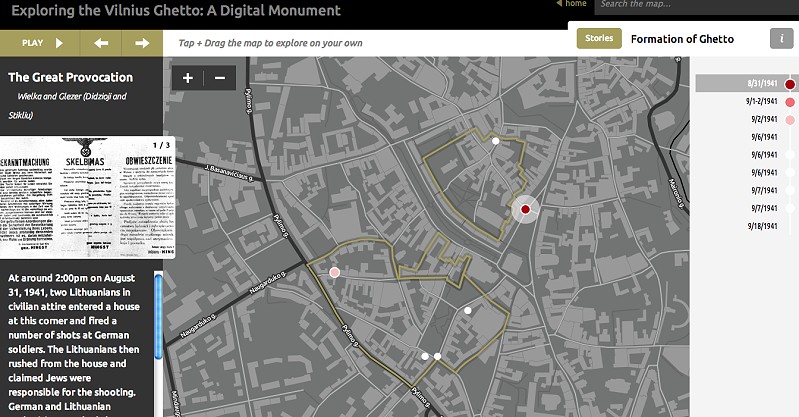Menachem Kaiser (USA)
Menachem Kaiser is a Brooklyn-based writer and critic whose fiction and non-fiction have appeared in such publications as Wall Street Journal, The Atlantic, Slate, Salon, Los Angeles Review of Books, Tablet, Stumble, Vogue, and New York. He is the creator of reVILNA, a digital interactive map of the Vilna Ghetto, and the author of the upcoming book Seven Streets. He is currently a fellow at the Writers Institute at City University of New York, and a recent Fulbright Fellow to Lithuania, where he taught Creative Writing in Vilnius University.
reVILNA
reVILNA; 2013, interactive
reVILNA is a project dedicated to re-imagining the historical space of the Vilna Ghetto; to allow, via technology and geographical science, the Ghetto to be digitally explored.
Researchers went through memoirs, archives, original ghetto documents, and histories, and geographically tagged nearly two hundred significant points and events in the ghetto. These were then mapped out, painstakingly organized into either chronological or location-based narratives, and paired with dozens of rare photographs.
The result is an unprecedented work of Holocaust scholarship: a fully immersible, dynamic, and interactive map of the Ghetto. Users can follow a tour, use the filters to explore on their own, or search for specific sites or events with the built-in search tool.
The map offers a rare glimpse into the Vilna Ghetto’s little-known histories: the resistance fighters, who smuggled arms through the sewer systems and trained in the basement of the library; the short-lived uprising; the remarkable hospital, which had laboratories and operating room, even, reportedly, brain surgery; the towering cultural achievements; the wildly popular sporting tournaments; the manufacturing of pharmaceutical drugs in the Ghetto; capital punishment carried out by the Jewish Ghetto administration — and so much more.
reVILNA is a three-tiered project. Firstly, the map is fully accessible online and completely free. Second, the database/software will be made available to any interested museum/institution for either physical or online installation; each institution can easily customize the map to their specifications. Third, a dedicated mobile version, with GPS-capability, will be finalized in the coming weeks; visitors to the Vilna Ghetto will then be able to pinpoint their location and view relevant information and photographs.
“How people perished in the Ghetto – that I understand; what I cannot understand is how the ylived.” — Chaim Grade
“reVILNA is one of the most significant advancements in Holocaust scholarship I’ve ever seen — a dazzling and effective combination of technology, geography, and history.” — Laimis Briedis, Geographer at the University of British Columbia

